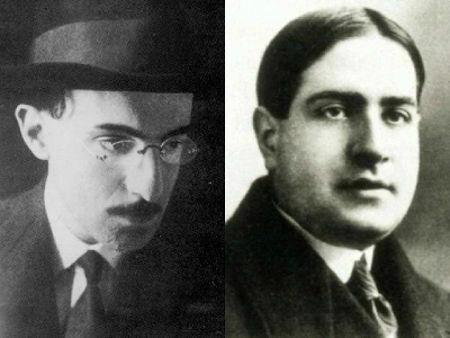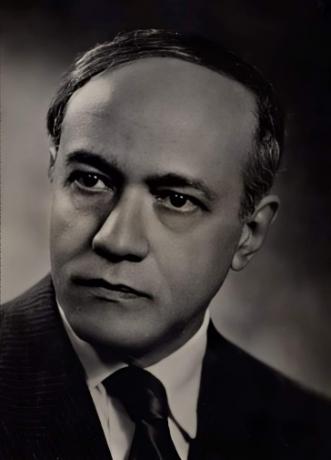What is properly reviewed in its essence of life and daily life, ceases to be ORPHEU, to better dress up its title and propose itself.
And by proposing, it binds the right to dissimilar itself in the first place from other means, ways of forms of performing art, having as It is remarkable that our volume of Beauty is not uncharacteristic or fragmented, as literary as these two ways of making magazines or newspaper.
Pure and rare your intentions as your destiny of Beauty is that of:—Exile!
Well properly, ORPHEU, is an exile of art temperaments that want it as a secret or torment…
Our intention is to form, in a group or idea, a chosen number of revelations in thought or art, which about this aristocratic principle has in ORPHEU its esoteric ideal and ours to feel and get to know each other.
Generation, race or middle photography, with its immediate world of exhibition, which is often called literature and is the epitome of what is called there magazine, with the variety to be reduced by the equality of subjects (article, section or moments) any attempt at art — ceases to exist in the concerned text of ORPHEU.
This explains our anxiety and our essence! (...)”.
(Preface by Luís de Montalvor to the first issue of the magazine Orpheu, March 1915).
The text you read now is the preface written by Portuguese writer Luís de Montalvor for the first edition of Orpheu Magazine, legendary literary publication responsible for spreading the ideals of the first modernists of Portugal. Attracted by modern European aesthetic currents, including Futurism and Cubism, the orphist writers they drastically broke with the pastism of poetry of a historical nature that prevailed in Portuguese literature at the beginning of the 20th century.

Fernando Pessoa and Mário de Sá-Carneiro are among the main representatives of Orphism in Portugal
Fernando Pessoa, Mario de Sá-Carneiro, Almada Negreiros, Raul Leal and Luís de Montalvor were the founders of Revista Orpheu, a Luso-Brazilian project that had the writer Ronald de Carvalho as responsible for its publication in Brazil. Under a strong climate of tension, after all, Europe was intensely experiencing the conflicts caused by the First World War, the orphist writers had to aim to create new forms of literary expression that would break with the narrow Portuguese cultural panorama, so marked by provincialism and attachment to the Symbolism. The orphists sought a dialogue with the artistic avant-gardes that erupted in Europe at the beginning of the 20th century, thus taking a look at the world and its technological innovations.
"In the painful light of the factory's large electric lamps
I have a fever and I write.
I write gritting my teeth, beast for the beauty of it,
For the beauty of it totally unknown to the ancients.
Do not stop now... There's more after the advertising ;)
O wheels, O gears, r-r-r-r-r-r-r eternal!
Strong restrained spasm of the furious machinery!
Raging inside and out,
For all my dissected nerves,
For all the buds out of everything I feel with!
I have dry lips, O great modern noises,
From listening to you too closely,
And my head burns from wanting you to sing with an excess
Expression of all my sensations,
With a contemporary excess of you, O machines! (...)”
(Excerpt from the poem “Ode Triunfal”, by the heteronym Álvaro de Campos, Fernando Pessoa. Published in Orpheu magazine number 1.)
Orpheu Magazine had only two editions, both launched in the first half of 1915. The publication's failure was due to the end of the sponsorship (Mário de Sá-Carneiro's father was the publication's involuntary patron) and also to the strong rejection of literary criticism and the public: the reception of the quarterly literature magazine was far from peaceful, the ideas conveyed in them sparked a great controversy in the Portuguese press, so used to literary canons and closed to the innovations proposed by the orphist writers. By making a commitment to socially engaged writing, Orphism broadened the horizons of a literature whose purpose was the aesthetic emotion in spite of the general anguish provoked by the crisis that devastated not only Europe, but the world.
salome
Purple insomnia. The light to crease in fear,
Dead moonlight, more Soul than the moon...
She dances, she creaks. The meat, naked alcohol,
It spreads to me in a spasm of secret...
Everything is a whim around you, in fatuous shadows...
The aroma went crazy, rose in color, broke...
I am cold... Alabaster... My Soul stopped...
And her body slides projecting statues...
She calls me in Iris. She loses me,
She squirts at my bare breasts, echoes me in tears...
Stamps, helmets, daggers... The crazy one wants to die for me:
She bites herself crying--there are sexes in her tears...
I rise in sound, I sway, and I leave, and I will burn
In the imperial mouth that humanized a Saint...
(Mário de Sá-Carneiro, in 'Indícios de Oiro'. Poem Published in Orpheu magazine number 1).
It was with the suicide of Mário de Sá-Carneiro that Orfismo definitively came to an end. Despite its ephemeral duration, Revista Orpheu achieved its objective, having been crucial for the introduction of modernism in Portugal and the development of new aesthetic currents, including the presence, which, although contrary to orphist ideals, helped to spread the literature produced by the first modernists and to consolidate Portuguese modernism. Thanks to Orphism, Portuguese poetry gained new contours by breaking with the historical past and to present a poetry whose purpose was to shock and provoke the bourgeoisie accustomed to the canon symbolist. It also presented a new theme in which man and his amazement at existing reached the protagonism.
By Luana Castro
Graduated in Letters



